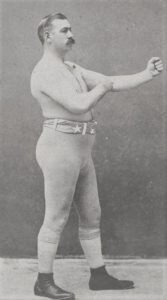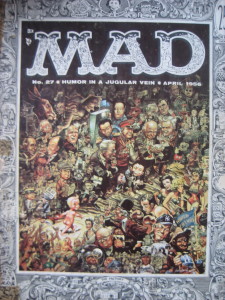My dad was a warehouse-man and mover and it was one of his jobs to clean out discarded and unclaimed storage lockers. This was a cool thing because he would be bringing home, every now and then, old newspapers (which he would sell to a local comic and magazine shop, among other vintage items for the house.
When I was twelve, my father brought home a box of 28 cast metal small statues of John L. Sullivan, bare chested and in trunks, in the traditional bare fist boxing pose. Mom asked him what was he going to do with them and he shrugged his shoulders and said, “Something.” Little did I know at the time those statues would lead to my musical career in a high school band.
I was in the Boy Scouts and wanted to be a bugler but I didnt have a bugle. No one did. Then, one afternoon, my cousin and I were roaming the neighborhood and I saw a used trumpet in the window of a resale shop.
We went inside and I asked to see the instrument. I couldn’t play it yet, but the valves worked okay so I asked how much. He wanted thirty dollars for it. I had two. As I was slowly walking out the door, I remembered the statuettes, turned and asked him if he would be interested in 28 statues of John L Sullivan and two dollars.
To my surprise, he told me to bring them in so he could see them. We ran home and I asked my father (it was a Saturday and he was in the basement working on something) if I could trade the statues for a trumpet. He told me if the guy would take them it would be okay.
I cannot remember exactly what they looked like. I do remember they were hollow and the greyish casting was sprayed with a gilt paint. Perhaps they may have been made for an award or presentation but there were no bases for the little guys. My cousin and I placed the box in my wagon and off we went, excited and hoping we could make the trade.
The owner looked through the box, satisfied that they were undamaged, told me they were pretty neat and made the trade. He let me keep my two dollars.
I wonder now and then what happened to those 28 statues. I have never seen one since. As I think about it, they may be worth some money nowadays. My trumpet was in sad shape I soon discovered and, even after a cleaning, didn’t sound that good. It was, however, good enough to take on scout outings and camping trips and I got pretty good at playing it by ear, listening to bugle calls on a record I had gotten.
My father saw my interest in playing bugle and other songs so two years later, when I entered high school and began playing in the band, he bought me a new Silvertone trumpet from Sears for my birthday.
Thinking back, I not only owe my musical career but also my interest in trading and selling collectibles, which I am still doing today, to John L Sullivan. As far as trumpet playing, I gave that up some time ago.
I could never hit the high notes.

